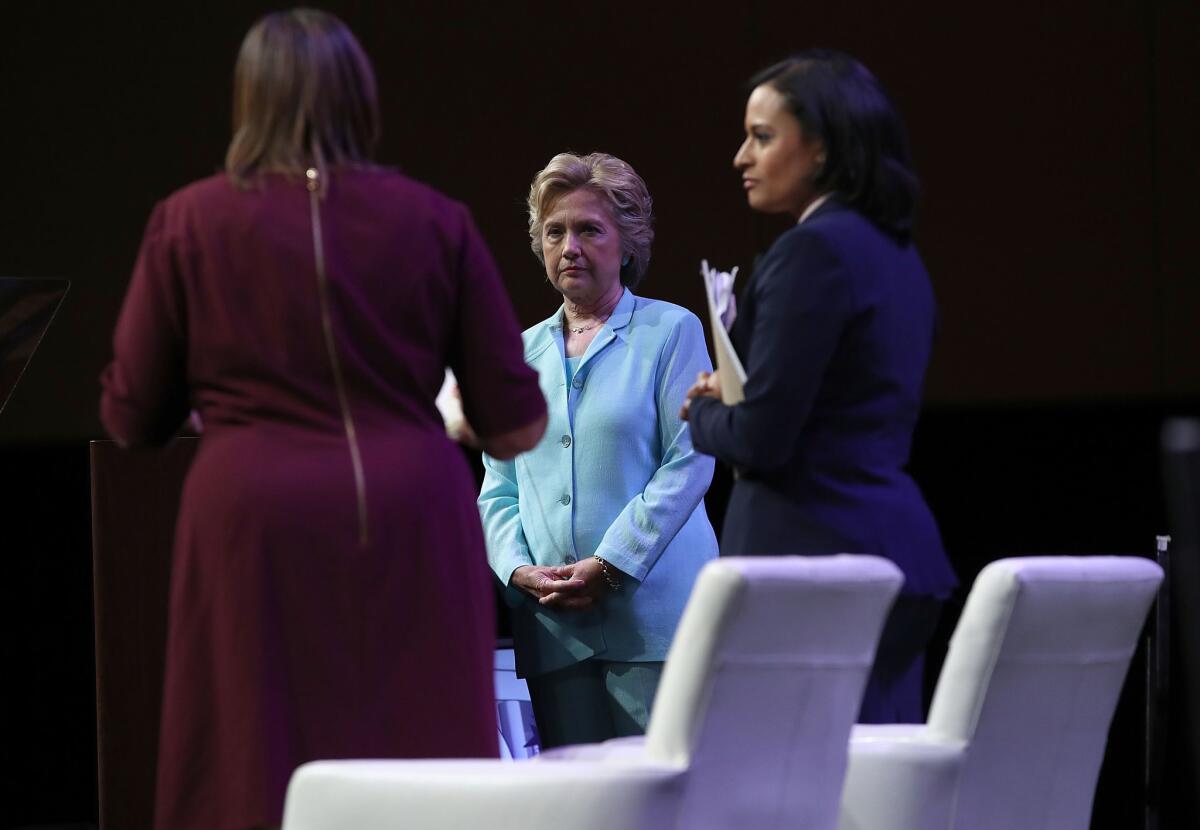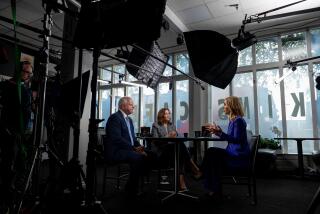Hillary Clinton’s post-convention bounce runs into a familiar wall: Emails

- Share via
Reporting from Washington — Friday could have marked the end of what has been arguably the best week of Hillary Clinton’s campaign.
Coming off a successful Democratic convention, combined with some of the most pronounced Republican infighting to date, Clinton took a commanding lead over GOP rival Donald Trump, both in national and many swing state polls.
But instead of capitalizing on the momentum, she tripped up again on her political Achilles’ heel — emails — before an audience she has kept at arm’s length over the last 16 months — journalists.
Speaking at a gathering of black and Latino reporters and editors in Washington, Clinton struggled to reconcile her previous public statements about the handling of sensitive information over a private email server with the critical assessment offered by the director of the Federal Bureau of Investigation.
Over the course of nearly four and a half minutes, Clinton first feinted toward acknowledging a recent misstatement, saying she offered a “short-circuited” response in a Fox News interview last weekend by suggesting FBI Director James B. Comey had concluded that her public statements about her use of a private email server while secretary of State were truthful. Comey had only said there was no evidence that she had lied to the FBI during its investigation into the matter.
Clinton attributed the confusion to miscommunication, explaining that she had intended to say that her statements in public were no different than those she had made to the FBI.
“What we have here is pretty much what I have been saying throughout this whole year. And that is, that I never sent or received anything that was marked classified,” she said again Friday.
But critics say that statement does not square with the FBI findings.

An examination of Hillary Clinton and Donald Trump’s convention acceptance speeches and how they line up on several key issues. Full coverage at latimes.com/conventions.
The FBI concluded that about 110 of the 30,000 emails Clinton provided for inspection were classified at the time they were sent, though they were not marked as such.
But even if the typical classified headings were not included, Comey said that “participants who know or should know that the subject matter is classified are still obligated to protect it.”
More problematic for Clinton was the FBI conclusion that three emails included special markings within the body of the text to indicate certain information was classified. That seemed to contradict Clinton’s assertion that she did not send any emails marked classified.
Though Comey recommended against criminal prosecution over the email episode, he said Clinton had been “extremely careless” in her handling of classified material.
Clinton’s tortured explanation Friday bore all the hallmarks of a legal argument, distinguishing between the special markings included in three emails and the more visible headings that typically are included on such sensitive documents.
Comey said in his testimony last month on Capitol Hill that he did not believe Clinton understood the meaning of the special markings. The State Department also said those markings were improperly applied due to human error, and that the three emails did not contain classified materials at the time they were sent.
But the explanations have not been a particularly satisfying political response, giving her struggling rival a chance to go back on the offensive.
“Clinton’s habitual lying about the use of her secret server to send and receive classified, top-secret information shows her blatant disregard for national security and a continued pattern of bad judgment,” Trump spokesman Jason Miller said. “Clinton knows the actions she has taken are disqualifying for someone wishing to become commander in chief, and that is why today’s painful, pretzel-like response to a simple question about her illegal server was obvious to everyone watching.”
The email controversy has proven to be the biggest drag in how voters perceive Clinton, despite the campaign’s best efforts to paint a more flattering public image. Clinton said Friday that she “takes it seriously” when polls show that voters view her as untrustworthy, but she also pushed back against such perceptions and cited her record of accomplishments over the years.
“Every time I’ve done a job, people have counted on me and trusted me,” Clinton said during the question-and-answer session at the joint convention of the National Assn. of Black Journalists and the National Assn. of Hispanic Journalists.
Before last week’s Democratic National Convention, 68% of respondents in a CNN/ORC poll said Clinton isn’t honest and trustworthy. That was up from 65% earlier in July and 59% in May.
“I do recognize I have work to do,” she said.
But Clinton seemed to cast voters’ perceptions more as a product of the polarized political climate than as a reflection of wrongdoing on her part. When she ran for Senate in New York in 2000, she noted, people had reservations about her candidacy. But she was able to prevail and was easily elected to a second term.
“I’m going to work my heart out in this campaign and as president to produce results for people,” she said.
Clinton came to the gathering pledging to try to unify the country, while cataloging Trump’s comments targeting various minority communities, particularly Latinos.
“America is better than this. America is better than Donald Trump,” she said.
She promoted her own detailed plans on a range of issues, particularly on the economy, and said wanted to be held accountable for them by both the public and the news media.
“I do have this old-fashioned idea, when you run for president you ought to tell the voters of America what you will do as president,” she said. “The stakes are as high as they’ve ever been in our lifetimes.”
In response to another question, she vowed to immediately begin working to pass comprehensive immigration reform if elected, saying legislation she planned to offer would be fast-tracked in the Senate, then political pressure would be put on the House.
“I am hoping that the outcome of the election … will send a clear message to our Republican friends that it’s time for them to quit standing in the way of immigration reform,” she said. “We’re going to start early and we’re going to be tenacious and absolutely committed to getting a positive result.”
For more 2016 campaign coverage, follow @mikememoli on Twitter
ALSO
Which Republicans are supporting Trump, and who’s jumping ship?
Bernie Sanders: I support Hillary Clinton. So should everyone who voted for me
In complicated Ohio, Trump and Clinton swap voters as they vie for a key state
More to Read
Get the L.A. Times Politics newsletter
Deeply reported insights into legislation, politics and policy from Sacramento, Washington and beyond. In your inbox three times per week.
You may occasionally receive promotional content from the Los Angeles Times.












